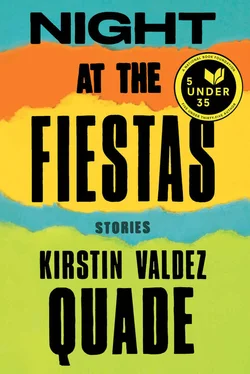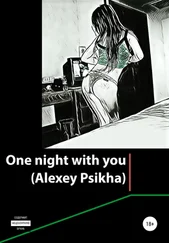Frances was sixteen years old and twitchy with impatience. If Frances’s life was to be a novel — as Frances fully intended — then finally, finally, something might happen at the Fiestas that could constitute the first page.
She’d spend the weekend with her aunt and cousin in their little stucco house on Marcy Street. Tonight they’d watch the burning of Zozobra, the enormous gape-mouthed effigy of Old Man Gloom, and then walk back to the Plaza for music and dancing that would last all night. And Saturday there’d be the Hysterical Parade and night dances at the La Fonda and the Legion Hall with mariachis imported all the way from Mexico. “We’ll be out until morning,” her cousin Nancy had assured her on the telephone. “We might not even go home then.” Frances believed it. A widow dying to remarry, her aunt Lillian was fun-loving and young-dressing, lax and indulgent of her teenage daughter, which was exactly why it had been such a feat for Frances to convince her mother to let her go.
“Lillian’s got absolute feathers for brains,” her mother had said again last night of her sister-in-law. “If having your husband drop dead before your eyes doesn’t pull you up short, I don’t know what will. Man crazy, the two of them. That girl’s going to end up in trouble, and Lillian will be too busy batting her own eyelashes to notice.”
“Mother,” Frances had said with superhuman forbearance, which was the only way she could bring herself to speak to her mother now. “Nancy’s not going to end up in trouble.” But Frances didn’t actually believe this, which was why Nancy was so appealing to be around, even if she was a year younger and made Frances feel dull and wholesome, an actual country cousin.
Frances was also hoping to see some beatniks and artists, who, Nancy had told her, lived in such unimaginable filth it would make you sick, and they actually liked it, didn’t even try to better themselves. “Ugh,” said Nancy. “A painter rents the shed behind my friend Sally’s neighbor’s house, and he’s so poor he trades his paintings for dog food. Sally says he eats the dog food right alongside the dog.”
Frances had somehow missed these characters in previous visits to the state capital, but apparently they came out in droves for the Fiestas, high on their drugs and flouting conventions left and right. Maybe one of these artists would take her back to his dingy house with the mattress on the floor and ask to paint her. Frances considered herself, like Tess, a vessel of emotion untinctured by experience, and Frances very much wanted to be tinctured.
So in preparation, she’d spent her carefully hoarded babysitting money on a new pink lipstick at Rexler’s and, at Barton’s, this emerald-green dress, with its low, square neck and matching belt. Frances was sorry that she hadn’t been able to afford a discreet weekend valise, too, powder-blue leather stamped to resemble alligator skin, like she’d seen in an ad for face cream in one of her mother’s magazines. Instead, she’d had to pack her clothes in her orange sun-patterned swimming bag, embarrassing and childish and completely inappropriate for this weekend.
“Fancy-Francy, I ever tell you about the time a lady left a baby on the bus?”
Frances tamped down a surge of irritation, closed her book, and gave her father a tight, tolerant smile in the mirror. “You have.”
Of course he had. Twice a day for twenty years he’d driven the same dusty two hundred miles between Raton and Santa Fe, never even stepping off his bus to walk down the faded main streets of the towns he passed through. Every single day, the landscape changing in the same ways: deepening or rippling, shading greener here, flatter there, from high plain to chaparral to woodland plateau and back again, the vistas unbroken except for the occasional herd of antelope or deer or, more rarely, elk. Of course he’d told her about the baby.
“You’re kidding,” said the crocheting woman. “Blessed be.”
“Yep,” her father said with enthusiasm. “She gathered up all her packages and boxes, but left the baby.”
He told it again, how another passenger had discovered the baby fast asleep on the seat when they were only a few miles outside of Maxwell, how he’d slowed the bus, made an excruciating many-pointed turn on the empty blacktop highway, and drove back to the depot in town. They found the woman without much trouble; it was a small town, and the man behind the ticket counter pointed her out, sitting on a bench outside the station, surrounded by her luggage.
Frances could understand wanting to abandon a baby; the mystery was why the woman had only left it on a bus and not in the boondocks where no one would find it. Frances babysat, but just because there were things she needed: beautiful, transformative clothes, a typewriter, a powder-blue valise. Above all, Frances needed to get out of Raton for good. She wanted to go to college, to take her place among the fresh-faced young men and women at UNM, skirt swinging and books clutched to her chest, her face raised to the warm possibility of romance. This weekend was practice for the day when she would board this bus again and never return.
“My God,” said the woman. “She must have been out of her head with worry.”
“Claimed it was a mistake and practically tore that baby from my arms. But I’m not sure she convinced me, wasn’t crying or anything. Who’s to say she didn’t pull the same stunt on some other guy’s route?” Still, the story had a happy ending: “All that, and we arrived in Santa Fe only nine minutes behind schedule.”
It was an excellent story made stupid by his telling: for instance, when he’d told it the first time at dinner, it was the turn that had seemed to interest him most; he’d demonstrated on the tablecloth using his knife as the bus.
Frances looked at her father in the driver’s seat — his round, sloping shoulders, the stubble on the back of his neck. He held the big wheel with both hands as if it were a roasting pan. He used to be a frustrated man, a shouter and a spanker. But he’d mellowed as Frances got older. Now he sought her company with a sort of sodden sentimentality that left her at once touched and galled.
“Shame I can’t go with you,” her father called. “To the Fiestas. It would be nice to see Lillian, spend some time with you girls.”
Frances kept her eyes on her book, pretending not to have heard. The swell of power this gave her was like an electric charge.
“Would you look at that,” he tried again, sweeping his hand across the windshield. “You don’t get views like these from an office, Francy.”
“Daddy, I have to do some reading. For school.” She held her book up to the mirror and sighed dramatically. “I’ll just move back. You two enjoy your conversation.”
“Smart as a whip, my girl,” her father told the crocheting woman, but Frances could hear the hurt in his voice.
She stood, lifted down her bag, and as she did, her dress ripped at the armpit. From her new seat she examined the tear. “Goddamn it,” she muttered, digging in her swimming bag for her cardigan. Up front, her father had fallen silent, his shoulders hunched. He needed to get used to her absence, Frances reasoned, because soon she’d leave for college, and then what would he do? She’d be kind to him when she got off in Santa Fe. She’d tell him she loved him. Frances put on her cardigan, and then, hot, sat back and opened her book.
IN WAGON MOUND, three people boarded. A thin red-cheeked woman in a gray dotted sundress sat across the aisle from Frances, and a man swinging a lunch sack took the seat in front of her. He smiled from under a bristly caterpillar of a mustache. Frances, aware of his eyes on her, looked out the window at the road blurring below. She pictured herself: her slow blush, lashes lowered against her cheek.
Читать дальше












